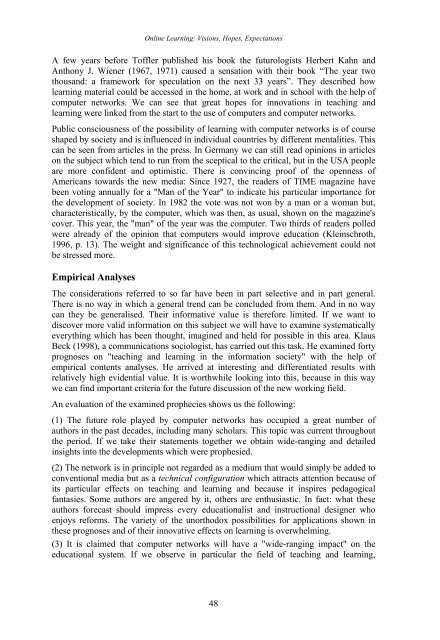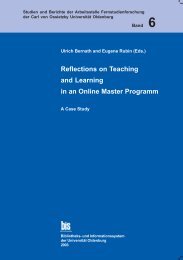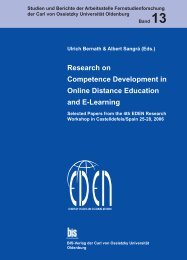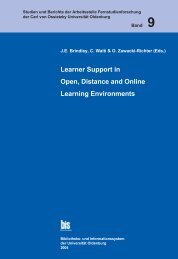Distance Education in Transition - Master of Distance Education ...
Distance Education in Transition - Master of Distance Education ...
Distance Education in Transition - Master of Distance Education ...
You also want an ePaper? Increase the reach of your titles
YUMPU automatically turns print PDFs into web optimized ePapers that Google loves.
Onl<strong>in</strong>e Learn<strong>in</strong>g: Visions, Hopes, Expectations<br />
A few years before T<strong>of</strong>fler published his book the futurologists Herbert Kahn and<br />
Anthony J. Wiener (1967, 1971) caused a sensation with their book “The year two<br />
thousand: a framework for speculation on the next 33 years”. They described how<br />
learn<strong>in</strong>g material could be accessed <strong>in</strong> the home, at work and <strong>in</strong> school with the help <strong>of</strong><br />
computer networks. We can see that great hopes for <strong>in</strong>novations <strong>in</strong> teach<strong>in</strong>g and<br />
learn<strong>in</strong>g were l<strong>in</strong>ked from the start to the use <strong>of</strong> computers and computer networks.<br />
Public consciousness <strong>of</strong> the possibility <strong>of</strong> learn<strong>in</strong>g with computer networks is <strong>of</strong> course<br />
shaped by society and is <strong>in</strong>fluenced <strong>in</strong> <strong>in</strong>dividual countries by different mentalities. This<br />
can be seen from articles <strong>in</strong> the press. In Germany we can still read op<strong>in</strong>ions <strong>in</strong> articles<br />
on the subject which tend to run from the sceptical to the critical, but <strong>in</strong> the USA people<br />
are more confident and optimistic. There is conv<strong>in</strong>c<strong>in</strong>g pro<strong>of</strong> <strong>of</strong> the openness <strong>of</strong><br />
Americans towards the new media: S<strong>in</strong>ce 1927, the readers <strong>of</strong> TIME magaz<strong>in</strong>e have<br />
been vot<strong>in</strong>g annually for a "Man <strong>of</strong> the Year" to <strong>in</strong>dicate his particular importance for<br />
the development <strong>of</strong> society. In 1982 the vote was not won by a man or a woman but,<br />
characteristically, by the computer, which was then, as usual, shown on the magaz<strong>in</strong>e's<br />
cover. This year, the "man" <strong>of</strong> the year was the computer. Two thirds <strong>of</strong> readers polled<br />
were already <strong>of</strong> the op<strong>in</strong>ion that computers would improve education (Kle<strong>in</strong>schroth,<br />
1996, p. 13). The weight and significance <strong>of</strong> this technological achievement could not<br />
be stressed more.<br />
Empirical Analyses<br />
The considerations referred to so far have been <strong>in</strong> part selective and <strong>in</strong> part general.<br />
There is no way <strong>in</strong> which a general trend can be concluded from them. And <strong>in</strong> no way<br />
can they be generalised. Their <strong>in</strong>formative value is therefore limited. If we want to<br />
discover more valid <strong>in</strong>formation on this subject we will have to exam<strong>in</strong>e systematically<br />
everyth<strong>in</strong>g which has been thought, imag<strong>in</strong>ed and held for possible <strong>in</strong> this area. Klaus<br />
Beck (1998), a communications sociologist, has carried out this task. He exam<strong>in</strong>ed forty<br />
prognoses on "teach<strong>in</strong>g and learn<strong>in</strong>g <strong>in</strong> the <strong>in</strong>formation society" with the help <strong>of</strong><br />
empirical contents analyses. He arrived at <strong>in</strong>terest<strong>in</strong>g and differentiated results with<br />
relatively high evidential value. It is worthwhile look<strong>in</strong>g <strong>in</strong>to this, because <strong>in</strong> this way<br />
we can f<strong>in</strong>d important criteria for the future discussion <strong>of</strong> the new work<strong>in</strong>g field.<br />
An evaluation <strong>of</strong> the exam<strong>in</strong>ed prophecies shows us the follow<strong>in</strong>g:<br />
(1) The future role played by computer networks has occupied a great number <strong>of</strong><br />
authors <strong>in</strong> the past decades, <strong>in</strong>clud<strong>in</strong>g many scholars. This topic was current throughout<br />
the period. If we take their statements together we obta<strong>in</strong> wide-rang<strong>in</strong>g and detailed<br />
<strong>in</strong>sights <strong>in</strong>to the developments which were prophesied.<br />
(2) The network is <strong>in</strong> pr<strong>in</strong>ciple not regarded as a medium that would simply be added to<br />
conventional media but as a technical configuration which attracts attention because <strong>of</strong><br />
its particular effects on teach<strong>in</strong>g and learn<strong>in</strong>g and because it <strong>in</strong>spires pedagogical<br />
fantasies. Some authors are angered by it, others are enthusiastic. In fact: what these<br />
authors forecast should impress every educationalist and <strong>in</strong>structional designer who<br />
enjoys reforms. The variety <strong>of</strong> the unorthodox possibilities for applications shown <strong>in</strong><br />
these prognoses and <strong>of</strong> their <strong>in</strong>novative effects on learn<strong>in</strong>g is overwhelm<strong>in</strong>g.<br />
(3) It is claimed that computer networks will have a "wide-rang<strong>in</strong>g impact" on the<br />
educational system. If we observe <strong>in</strong> particular the field <strong>of</strong> teach<strong>in</strong>g and learn<strong>in</strong>g,<br />
48





